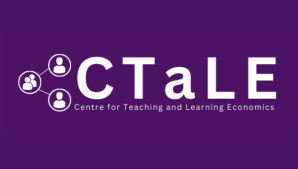
Author: June Hong
BSc Economics Y1
TeachECONference2021 Student Partner
Writing is undoubtedly a huge component in Economics, but it is quite different from traditional writing in other fields. In the third session of TeachECONference2021, presenters discussed the best ways to teach the unique writing methods of Economists.
Traditional ‘writing’ isn’t the only form of writing
The first presentation, ‘Incorporating Writing to Learn in an Economics Curriculum’ by Janice Kinghorn and Ling Shao of Miami University, addressed writing on the grounds that diagrams, tables, etc. are a perfectly valid form of writing. They explained that, like English, diagrams deliver information with a particular grammar, implied audience, and various stylistic elements. Janice and Ling explain that when this form of writing is taught to students, it is often taken for granted they understand how to read or write it. Most of the time, this is not the case and this results in confusion. While the UCL Economics course seems to do a good job teaching students from the ground up, I can definitely see how missing a slight detail about formatting, for example, could make it hard to understand an entire equation or graph.
Linking with the real world
Paul Winghart of the University of Northwestern, St Paul, presented about ‘Connecting (Economic) Content with Current Concepts.’ Each week, he sets a writing assignment called ‘Headline of the Week’ including 6 different articles from that week. Students have to connect the articles to something they learn that week. By doing so, Paul exposes students to all sorts of media and shows them that what they’re learning is very applicable to the real world. He only asks for one paragraph, so it does not pose a significant burden for students despite the assignment being weekly. As a student who, like many, was motivated to study economics by real world examples, such an assignment would keep me interested in the course. We had similar assignments, although not on a regular basis, where we had to link what we learnt to the real world, and I found those assignments to be the most enjoyable. As expected, Paul says he received fantastic feedback from students.
Doing is the best way to learn
The last presentation of the day was ‘Writing in the Discipline and Reproducible Methods: a process-oriented approach to teaching empirical undergraduate economics research’ by Professor Anthony Underwood from Dickinson College. He proposes an assessed project which emphasizes ‘doing’. The project encompasses everything from using Stata and data management, literature review, and academic writing. Prof Underwood emphasizes that students must submit replication documentation, containing the processes the student went through to reach their final product. This ensures that the process is reproducible, and slows down the students in a good way, preventing from ‘rushing to regress’ and making errors. I feel like although this will create a bigger workload, it would help students’ true understanding of the material. Quite often when doing empirical projects, I am tempted to simply use the formulas and codes we were taught without understanding what they really do. Prof Underwood’s assignment would not let that happen. The project stretches across an entire 15-week semester, which I believe would allow students to truly build their skills and knowledge as they go.
This session gave me an insight into how unique economic writing is, and correspondingly the unique ways to teach it effectively. It is astonishing to see the thoughts put into making our education more effective and interesting, and I have found an appreciation for the lecturers who would have designed our course.
More TeachECONference2021 Reflections:
- COVID and education: What educators have to say, and a student perspective
- Giving yourself your own grade, expressing your emotions to your professor, and experimenting with data: Inspiring ideas for economics education
- Lessons Learned from Teaching in a Pandemic
- Helping Students Succeed in Economics
- Best Practices and New Ideas for Teaching Econometrics

5 thoughts on “Economists write differently. The uniqueness of economic writing and how to teach it”